An Analysis of Knowledge Management Systems
VerifiedAdded on 2020/07/23
|6
|1800
|144
AI Summary
This assignment requires an in-depth analysis of knowledge management systems (KMS), including their importance, types, and benefits. It also covers various research methods used to study KMS, such as quantitative, qualitative, and mixed-methods approaches. The assignment provides a comprehensive review of literature on KMS, including articles and books from reputable sources. Additionally, it discusses the role of communication and motivation in KMS implementation and highlights the challenges and limitations associated with KMS adoption. Overall, this assignment offers a thorough understanding of KMS and research methods for effective implementation.
Contribute Materials
Your contribution can guide someone’s learning journey. Share your
documents today.
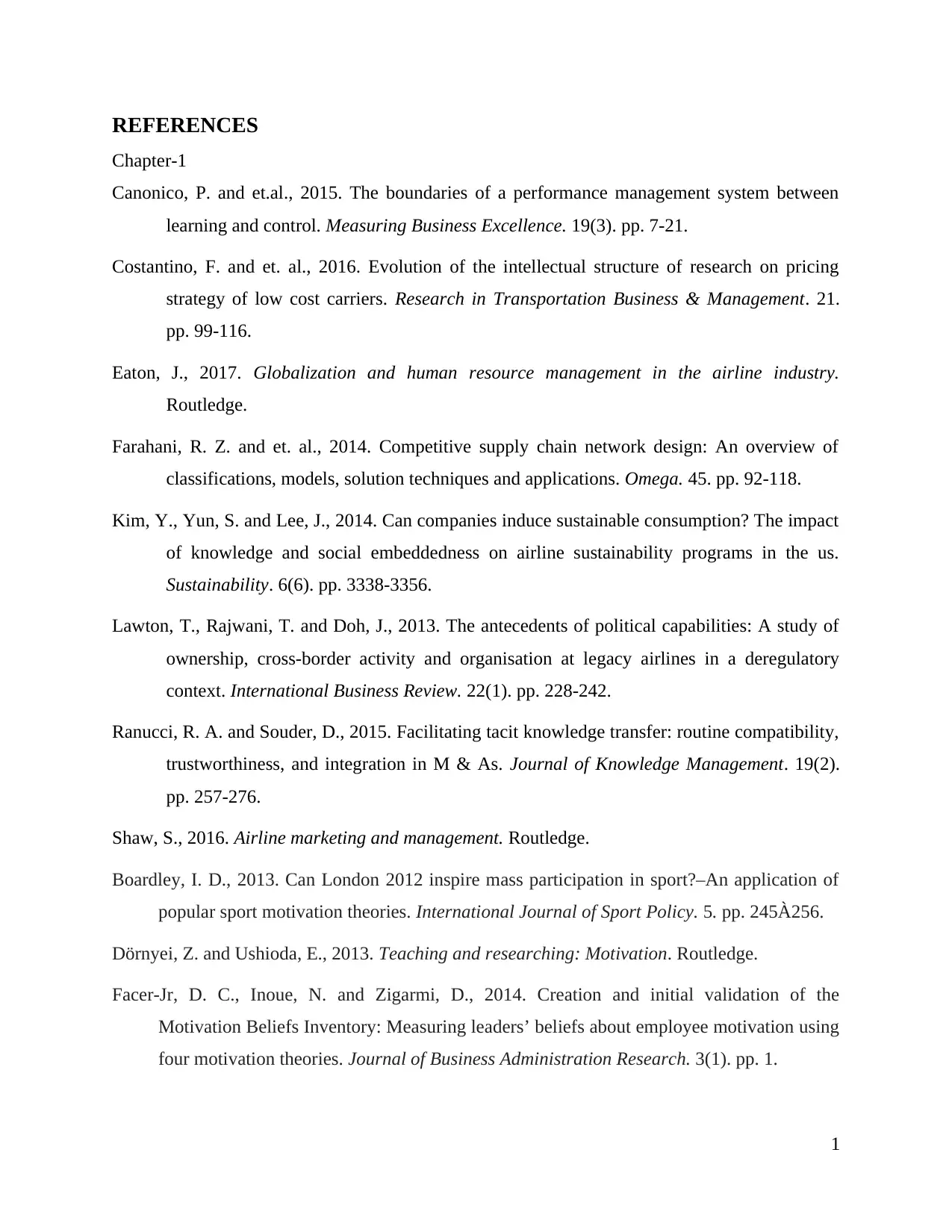
REFERENCES
Chapter-1
Canonico, P. and et.al., 2015. The boundaries of a performance management system between
learning and control. Measuring Business Excellence. 19(3). pp. 7-21.
Costantino, F. and et. al., 2016. Evolution of the intellectual structure of research on pricing
strategy of low cost carriers. Research in Transportation Business & Management. 21.
pp. 99-116.
Eaton, J., 2017. Globalization and human resource management in the airline industry.
Routledge.
Farahani, R. Z. and et. al., 2014. Competitive supply chain network design: An overview of
classifications, models, solution techniques and applications. Omega. 45. pp. 92-118.
Kim, Y., Yun, S. and Lee, J., 2014. Can companies induce sustainable consumption? The impact
of knowledge and social embeddedness on airline sustainability programs in the us.
Sustainability. 6(6). pp. 3338-3356.
Lawton, T., Rajwani, T. and Doh, J., 2013. The antecedents of political capabilities: A study of
ownership, cross-border activity and organisation at legacy airlines in a deregulatory
context. International Business Review. 22(1). pp. 228-242.
Ranucci, R. A. and Souder, D., 2015. Facilitating tacit knowledge transfer: routine compatibility,
trustworthiness, and integration in M & As. Journal of Knowledge Management. 19(2).
pp. 257-276.
Shaw, S., 2016. Airline marketing and management. Routledge.
Boardley, I. D., 2013. Can London 2012 inspire mass participation in sport?–An application of
popular sport motivation theories. International Journal of Sport Policy. 5. pp. 245À256.
Dörnyei, Z. and Ushioda, E., 2013. Teaching and researching: Motivation. Routledge.
Facer-Jr, D. C., Inoue, N. and Zigarmi, D., 2014. Creation and initial validation of the
Motivation Beliefs Inventory: Measuring leaders’ beliefs about employee motivation using
four motivation theories. Journal of Business Administration Research. 3(1). pp. 1.
1
Chapter-1
Canonico, P. and et.al., 2015. The boundaries of a performance management system between
learning and control. Measuring Business Excellence. 19(3). pp. 7-21.
Costantino, F. and et. al., 2016. Evolution of the intellectual structure of research on pricing
strategy of low cost carriers. Research in Transportation Business & Management. 21.
pp. 99-116.
Eaton, J., 2017. Globalization and human resource management in the airline industry.
Routledge.
Farahani, R. Z. and et. al., 2014. Competitive supply chain network design: An overview of
classifications, models, solution techniques and applications. Omega. 45. pp. 92-118.
Kim, Y., Yun, S. and Lee, J., 2014. Can companies induce sustainable consumption? The impact
of knowledge and social embeddedness on airline sustainability programs in the us.
Sustainability. 6(6). pp. 3338-3356.
Lawton, T., Rajwani, T. and Doh, J., 2013. The antecedents of political capabilities: A study of
ownership, cross-border activity and organisation at legacy airlines in a deregulatory
context. International Business Review. 22(1). pp. 228-242.
Ranucci, R. A. and Souder, D., 2015. Facilitating tacit knowledge transfer: routine compatibility,
trustworthiness, and integration in M & As. Journal of Knowledge Management. 19(2).
pp. 257-276.
Shaw, S., 2016. Airline marketing and management. Routledge.
Boardley, I. D., 2013. Can London 2012 inspire mass participation in sport?–An application of
popular sport motivation theories. International Journal of Sport Policy. 5. pp. 245À256.
Dörnyei, Z. and Ushioda, E., 2013. Teaching and researching: Motivation. Routledge.
Facer-Jr, D. C., Inoue, N. and Zigarmi, D., 2014. Creation and initial validation of the
Motivation Beliefs Inventory: Measuring leaders’ beliefs about employee motivation using
four motivation theories. Journal of Business Administration Research. 3(1). pp. 1.
1
Secure Best Marks with AI Grader
Need help grading? Try our AI Grader for instant feedback on your assignments.
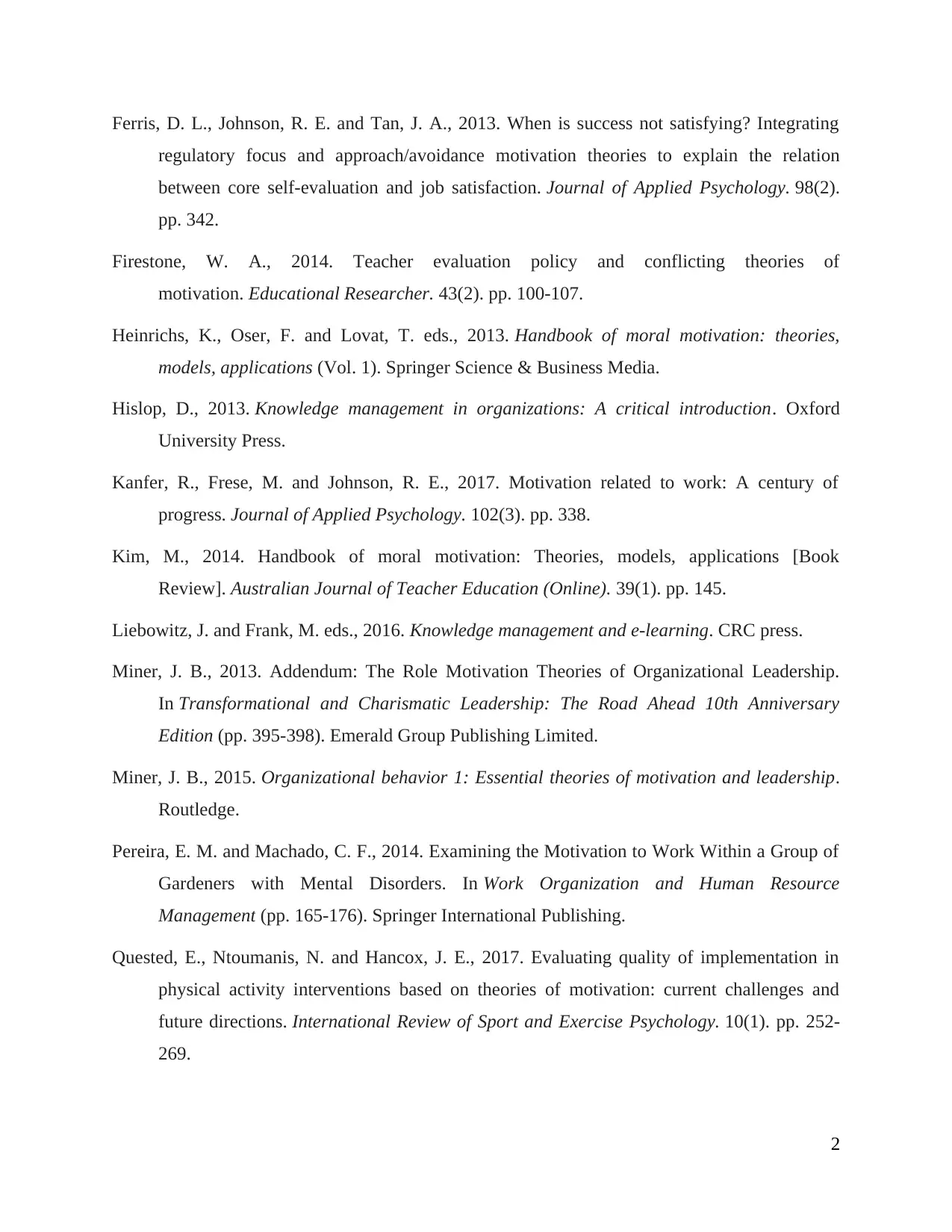
Ferris, D. L., Johnson, R. E. and Tan, J. A., 2013. When is success not satisfying? Integrating
regulatory focus and approach/avoidance motivation theories to explain the relation
between core self-evaluation and job satisfaction. Journal of Applied Psychology. 98(2).
pp. 342.
Firestone, W. A., 2014. Teacher evaluation policy and conflicting theories of
motivation. Educational Researcher. 43(2). pp. 100-107.
Heinrichs, K., Oser, F. and Lovat, T. eds., 2013. Handbook of moral motivation: theories,
models, applications (Vol. 1). Springer Science & Business Media.
Hislop, D., 2013. Knowledge management in organizations: A critical introduction. Oxford
University Press.
Kanfer, R., Frese, M. and Johnson, R. E., 2017. Motivation related to work: A century of
progress. Journal of Applied Psychology. 102(3). pp. 338.
Kim, M., 2014. Handbook of moral motivation: Theories, models, applications [Book
Review]. Australian Journal of Teacher Education (Online). 39(1). pp. 145.
Liebowitz, J. and Frank, M. eds., 2016. Knowledge management and e-learning. CRC press.
Miner, J. B., 2013. Addendum: The Role Motivation Theories of Organizational Leadership.
In Transformational and Charismatic Leadership: The Road Ahead 10th Anniversary
Edition (pp. 395-398). Emerald Group Publishing Limited.
Miner, J. B., 2015. Organizational behavior 1: Essential theories of motivation and leadership.
Routledge.
Pereira, E. M. and Machado, C. F., 2014. Examining the Motivation to Work Within a Group of
Gardeners with Mental Disorders. In Work Organization and Human Resource
Management (pp. 165-176). Springer International Publishing.
Quested, E., Ntoumanis, N. and Hancox, J. E., 2017. Evaluating quality of implementation in
physical activity interventions based on theories of motivation: current challenges and
future directions. International Review of Sport and Exercise Psychology. 10(1). pp. 252-
269.
2
regulatory focus and approach/avoidance motivation theories to explain the relation
between core self-evaluation and job satisfaction. Journal of Applied Psychology. 98(2).
pp. 342.
Firestone, W. A., 2014. Teacher evaluation policy and conflicting theories of
motivation. Educational Researcher. 43(2). pp. 100-107.
Heinrichs, K., Oser, F. and Lovat, T. eds., 2013. Handbook of moral motivation: theories,
models, applications (Vol. 1). Springer Science & Business Media.
Hislop, D., 2013. Knowledge management in organizations: A critical introduction. Oxford
University Press.
Kanfer, R., Frese, M. and Johnson, R. E., 2017. Motivation related to work: A century of
progress. Journal of Applied Psychology. 102(3). pp. 338.
Kim, M., 2014. Handbook of moral motivation: Theories, models, applications [Book
Review]. Australian Journal of Teacher Education (Online). 39(1). pp. 145.
Liebowitz, J. and Frank, M. eds., 2016. Knowledge management and e-learning. CRC press.
Miner, J. B., 2013. Addendum: The Role Motivation Theories of Organizational Leadership.
In Transformational and Charismatic Leadership: The Road Ahead 10th Anniversary
Edition (pp. 395-398). Emerald Group Publishing Limited.
Miner, J. B., 2015. Organizational behavior 1: Essential theories of motivation and leadership.
Routledge.
Pereira, E. M. and Machado, C. F., 2014. Examining the Motivation to Work Within a Group of
Gardeners with Mental Disorders. In Work Organization and Human Resource
Management (pp. 165-176). Springer International Publishing.
Quested, E., Ntoumanis, N. and Hancox, J. E., 2017. Evaluating quality of implementation in
physical activity interventions based on theories of motivation: current challenges and
future directions. International Review of Sport and Exercise Psychology. 10(1). pp. 252-
269.
2
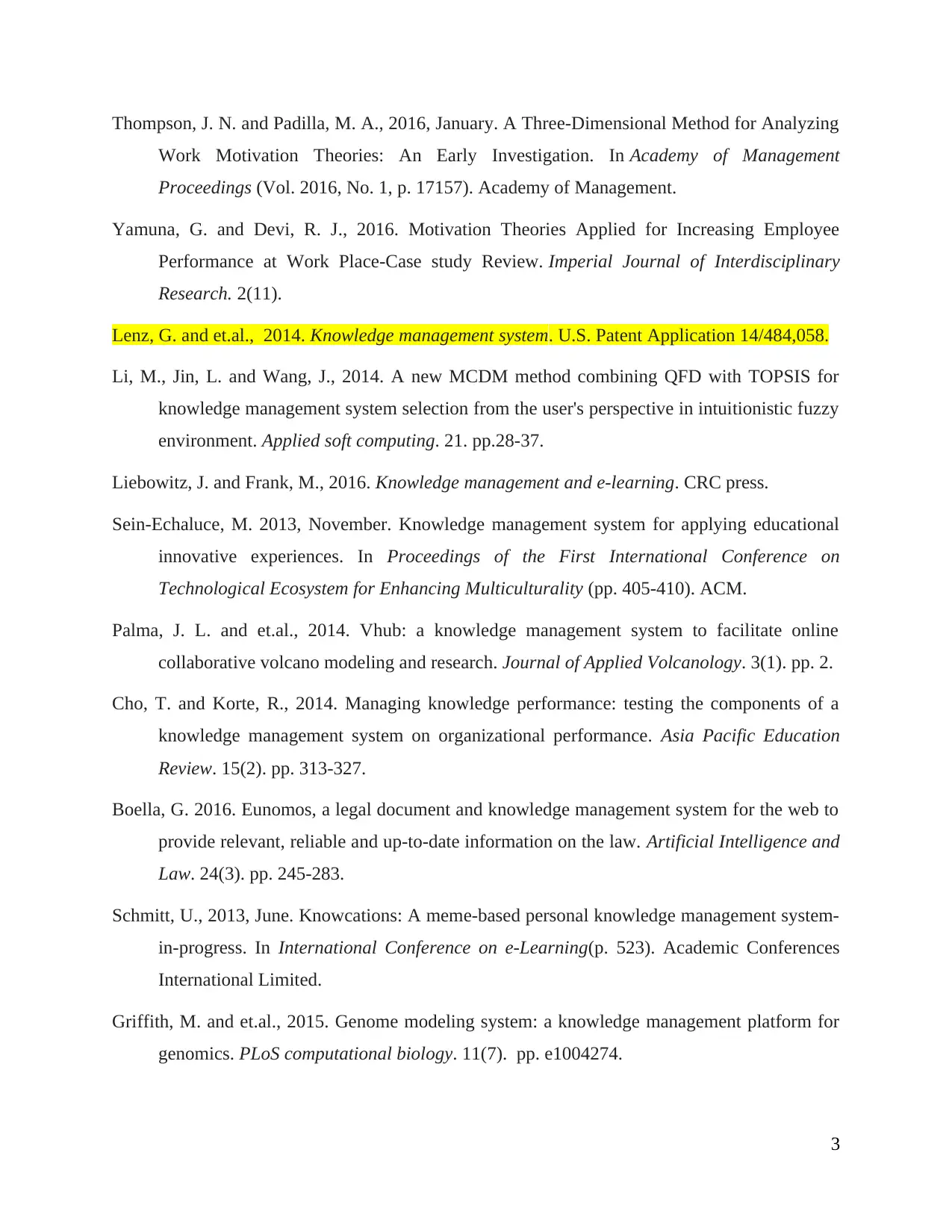
Thompson, J. N. and Padilla, M. A., 2016, January. A Three-Dimensional Method for Analyzing
Work Motivation Theories: An Early Investigation. In Academy of Management
Proceedings (Vol. 2016, No. 1, p. 17157). Academy of Management.
Yamuna, G. and Devi, R. J., 2016. Motivation Theories Applied for Increasing Employee
Performance at Work Place-Case study Review. Imperial Journal of Interdisciplinary
Research. 2(11).
Lenz, G. and et.al., 2014. Knowledge management system. U.S. Patent Application 14/484,058.
Li, M., Jin, L. and Wang, J., 2014. A new MCDM method combining QFD with TOPSIS for
knowledge management system selection from the user's perspective in intuitionistic fuzzy
environment. Applied soft computing. 21. pp.28-37.
Liebowitz, J. and Frank, M., 2016. Knowledge management and e-learning. CRC press.
Sein-Echaluce, M. 2013, November. Knowledge management system for applying educational
innovative experiences. In Proceedings of the First International Conference on
Technological Ecosystem for Enhancing Multiculturality (pp. 405-410). ACM.
Palma, J. L. and et.al., 2014. Vhub: a knowledge management system to facilitate online
collaborative volcano modeling and research. Journal of Applied Volcanology. 3(1). pp. 2.
Cho, T. and Korte, R., 2014. Managing knowledge performance: testing the components of a
knowledge management system on organizational performance. Asia Pacific Education
Review. 15(2). pp. 313-327.
Boella, G. 2016. Eunomos, a legal document and knowledge management system for the web to
provide relevant, reliable and up-to-date information on the law. Artificial Intelligence and
Law. 24(3). pp. 245-283.
Schmitt, U., 2013, June. Knowcations: A meme-based personal knowledge management system-
in-progress. In International Conference on e-Learning(p. 523). Academic Conferences
International Limited.
Griffith, M. and et.al., 2015. Genome modeling system: a knowledge management platform for
genomics. PLoS computational biology. 11(7). pp. e1004274.
3
Work Motivation Theories: An Early Investigation. In Academy of Management
Proceedings (Vol. 2016, No. 1, p. 17157). Academy of Management.
Yamuna, G. and Devi, R. J., 2016. Motivation Theories Applied for Increasing Employee
Performance at Work Place-Case study Review. Imperial Journal of Interdisciplinary
Research. 2(11).
Lenz, G. and et.al., 2014. Knowledge management system. U.S. Patent Application 14/484,058.
Li, M., Jin, L. and Wang, J., 2014. A new MCDM method combining QFD with TOPSIS for
knowledge management system selection from the user's perspective in intuitionistic fuzzy
environment. Applied soft computing. 21. pp.28-37.
Liebowitz, J. and Frank, M., 2016. Knowledge management and e-learning. CRC press.
Sein-Echaluce, M. 2013, November. Knowledge management system for applying educational
innovative experiences. In Proceedings of the First International Conference on
Technological Ecosystem for Enhancing Multiculturality (pp. 405-410). ACM.
Palma, J. L. and et.al., 2014. Vhub: a knowledge management system to facilitate online
collaborative volcano modeling and research. Journal of Applied Volcanology. 3(1). pp. 2.
Cho, T. and Korte, R., 2014. Managing knowledge performance: testing the components of a
knowledge management system on organizational performance. Asia Pacific Education
Review. 15(2). pp. 313-327.
Boella, G. 2016. Eunomos, a legal document and knowledge management system for the web to
provide relevant, reliable and up-to-date information on the law. Artificial Intelligence and
Law. 24(3). pp. 245-283.
Schmitt, U., 2013, June. Knowcations: A meme-based personal knowledge management system-
in-progress. In International Conference on e-Learning(p. 523). Academic Conferences
International Limited.
Griffith, M. and et.al., 2015. Genome modeling system: a knowledge management platform for
genomics. PLoS computational biology. 11(7). pp. e1004274.
3
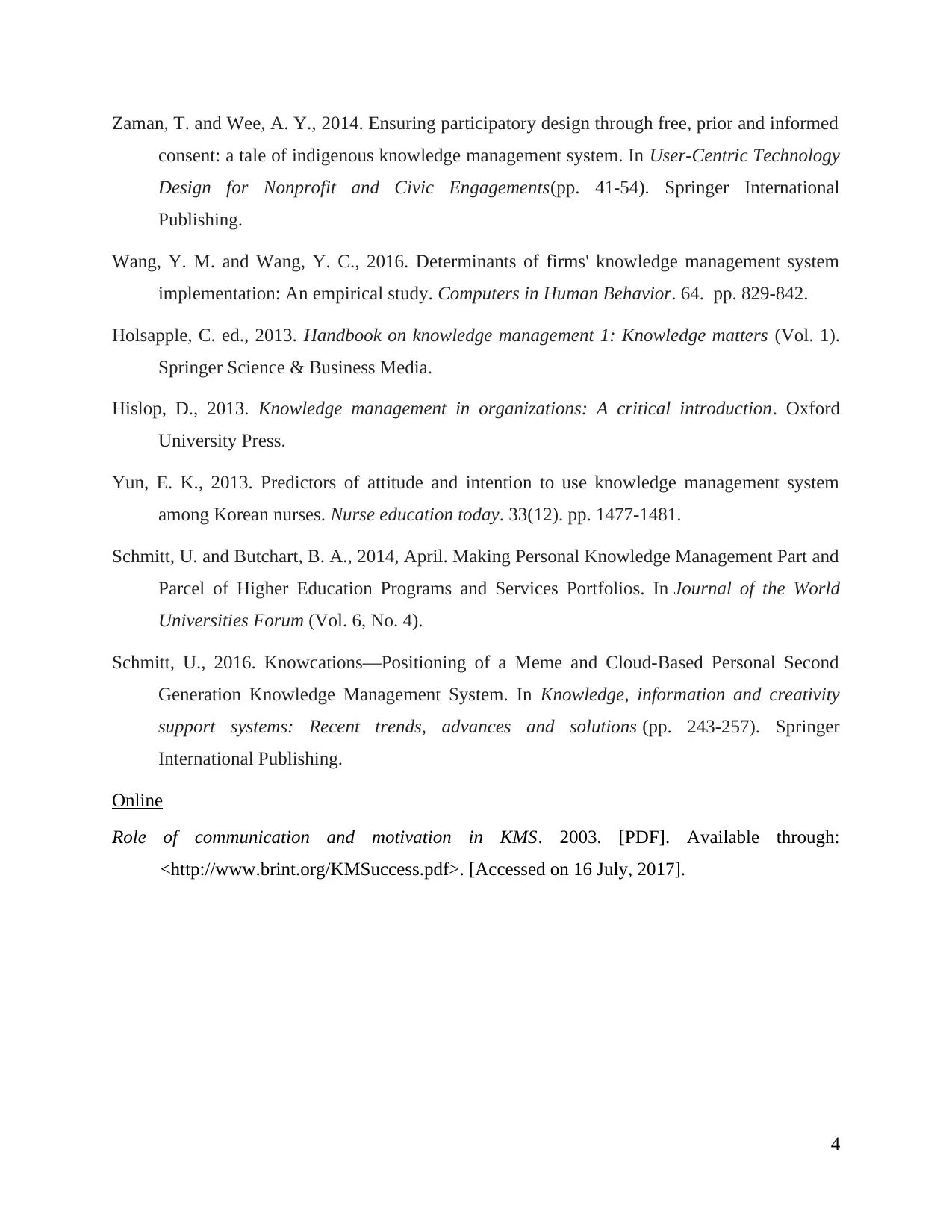
Zaman, T. and Wee, A. Y., 2014. Ensuring participatory design through free, prior and informed
consent: a tale of indigenous knowledge management system. In User-Centric Technology
Design for Nonprofit and Civic Engagements(pp. 41-54). Springer International
Publishing.
Wang, Y. M. and Wang, Y. C., 2016. Determinants of firms' knowledge management system
implementation: An empirical study. Computers in Human Behavior. 64. pp. 829-842.
Holsapple, C. ed., 2013. Handbook on knowledge management 1: Knowledge matters (Vol. 1).
Springer Science & Business Media.
Hislop, D., 2013. Knowledge management in organizations: A critical introduction. Oxford
University Press.
Yun, E. K., 2013. Predictors of attitude and intention to use knowledge management system
among Korean nurses. Nurse education today. 33(12). pp. 1477-1481.
Schmitt, U. and Butchart, B. A., 2014, April. Making Personal Knowledge Management Part and
Parcel of Higher Education Programs and Services Portfolios. In Journal of the World
Universities Forum (Vol. 6, No. 4).
Schmitt, U., 2016. Knowcations—Positioning of a Meme and Cloud-Based Personal Second
Generation Knowledge Management System. In Knowledge, information and creativity
support systems: Recent trends, advances and solutions (pp. 243-257). Springer
International Publishing.
Online
Role of communication and motivation in KMS. 2003. [PDF]. Available through:
<http://www.brint.org/KMSuccess.pdf>. [Accessed on 16 July, 2017].
4
consent: a tale of indigenous knowledge management system. In User-Centric Technology
Design for Nonprofit and Civic Engagements(pp. 41-54). Springer International
Publishing.
Wang, Y. M. and Wang, Y. C., 2016. Determinants of firms' knowledge management system
implementation: An empirical study. Computers in Human Behavior. 64. pp. 829-842.
Holsapple, C. ed., 2013. Handbook on knowledge management 1: Knowledge matters (Vol. 1).
Springer Science & Business Media.
Hislop, D., 2013. Knowledge management in organizations: A critical introduction. Oxford
University Press.
Yun, E. K., 2013. Predictors of attitude and intention to use knowledge management system
among Korean nurses. Nurse education today. 33(12). pp. 1477-1481.
Schmitt, U. and Butchart, B. A., 2014, April. Making Personal Knowledge Management Part and
Parcel of Higher Education Programs and Services Portfolios. In Journal of the World
Universities Forum (Vol. 6, No. 4).
Schmitt, U., 2016. Knowcations—Positioning of a Meme and Cloud-Based Personal Second
Generation Knowledge Management System. In Knowledge, information and creativity
support systems: Recent trends, advances and solutions (pp. 243-257). Springer
International Publishing.
Online
Role of communication and motivation in KMS. 2003. [PDF]. Available through:
<http://www.brint.org/KMSuccess.pdf>. [Accessed on 16 July, 2017].
4
Secure Best Marks with AI Grader
Need help grading? Try our AI Grader for instant feedback on your assignments.
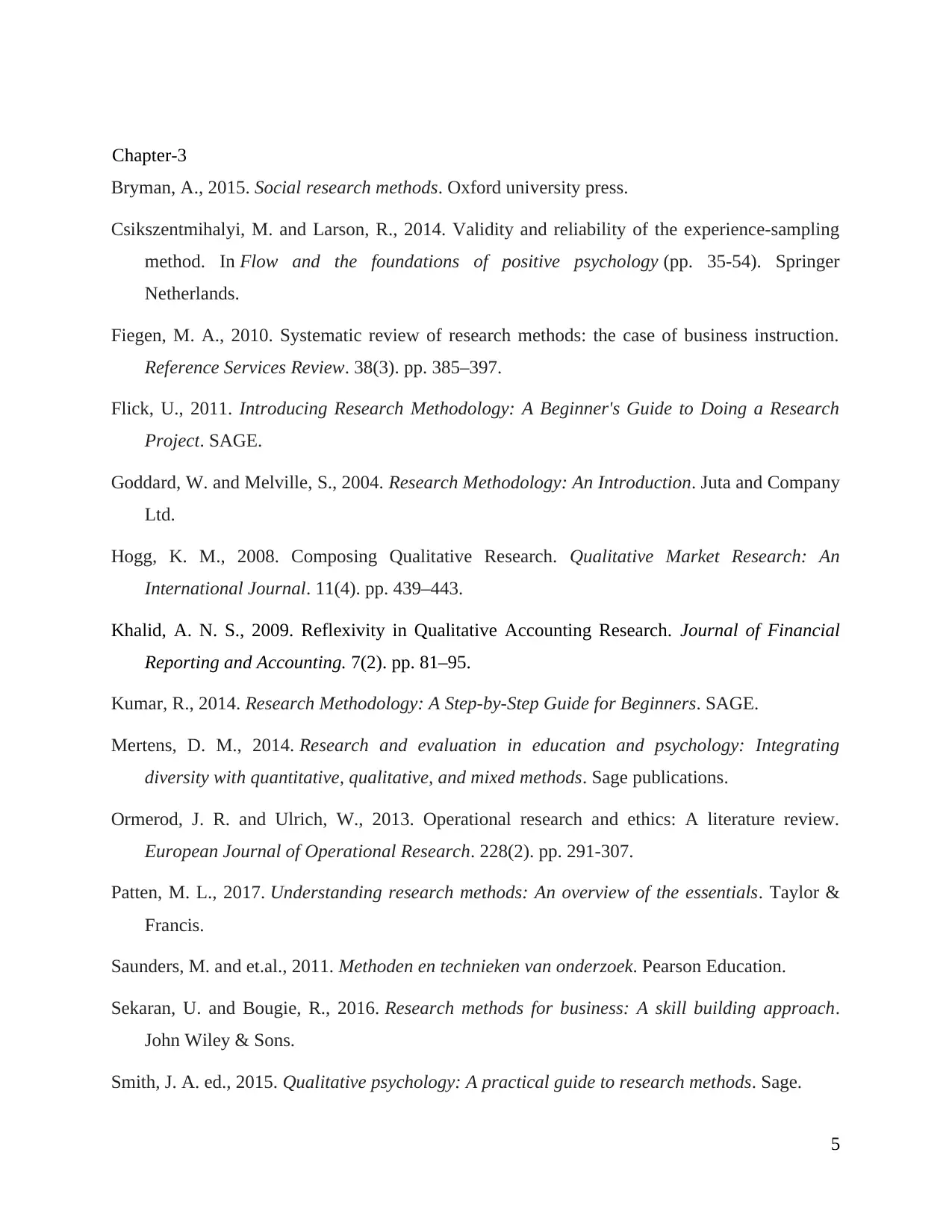
Chapter-3
Bryman, A., 2015. Social research methods. Oxford university press.
Csikszentmihalyi, M. and Larson, R., 2014. Validity and reliability of the experience-sampling
method. In Flow and the foundations of positive psychology (pp. 35-54). Springer
Netherlands.
Fiegen, M. A., 2010. Systematic review of research methods: the case of business instruction.
Reference Services Review. 38(3). pp. 385–397.
Flick, U., 2011. Introducing Research Methodology: A Beginner's Guide to Doing a Research
Project. SAGE.
Goddard, W. and Melville, S., 2004. Research Methodology: An Introduction. Juta and Company
Ltd.
Hogg, K. M., 2008. Composing Qualitative Research. Qualitative Market Research: An
International Journal. 11(4). pp. 439–443.
Khalid, A. N. S., 2009. Reflexivity in Qualitative Accounting Research. Journal of Financial
Reporting and Accounting. 7(2). pp. 81–95.
Kumar, R., 2014. Research Methodology: A Step-by-Step Guide for Beginners. SAGE.
Mertens, D. M., 2014. Research and evaluation in education and psychology: Integrating
diversity with quantitative, qualitative, and mixed methods. Sage publications.
Ormerod, J. R. and Ulrich, W., 2013. Operational research and ethics: A literature review.
European Journal of Operational Research. 228(2). pp. 291-307.
Patten, M. L., 2017. Understanding research methods: An overview of the essentials. Taylor &
Francis.
Saunders, M. and et.al., 2011. Methoden en technieken van onderzoek. Pearson Education.
Sekaran, U. and Bougie, R., 2016. Research methods for business: A skill building approach.
John Wiley & Sons.
Smith, J. A. ed., 2015. Qualitative psychology: A practical guide to research methods. Sage.
5
Bryman, A., 2015. Social research methods. Oxford university press.
Csikszentmihalyi, M. and Larson, R., 2014. Validity and reliability of the experience-sampling
method. In Flow and the foundations of positive psychology (pp. 35-54). Springer
Netherlands.
Fiegen, M. A., 2010. Systematic review of research methods: the case of business instruction.
Reference Services Review. 38(3). pp. 385–397.
Flick, U., 2011. Introducing Research Methodology: A Beginner's Guide to Doing a Research
Project. SAGE.
Goddard, W. and Melville, S., 2004. Research Methodology: An Introduction. Juta and Company
Ltd.
Hogg, K. M., 2008. Composing Qualitative Research. Qualitative Market Research: An
International Journal. 11(4). pp. 439–443.
Khalid, A. N. S., 2009. Reflexivity in Qualitative Accounting Research. Journal of Financial
Reporting and Accounting. 7(2). pp. 81–95.
Kumar, R., 2014. Research Methodology: A Step-by-Step Guide for Beginners. SAGE.
Mertens, D. M., 2014. Research and evaluation in education and psychology: Integrating
diversity with quantitative, qualitative, and mixed methods. Sage publications.
Ormerod, J. R. and Ulrich, W., 2013. Operational research and ethics: A literature review.
European Journal of Operational Research. 228(2). pp. 291-307.
Patten, M. L., 2017. Understanding research methods: An overview of the essentials. Taylor &
Francis.
Saunders, M. and et.al., 2011. Methoden en technieken van onderzoek. Pearson Education.
Sekaran, U. and Bougie, R., 2016. Research methods for business: A skill building approach.
John Wiley & Sons.
Smith, J. A. ed., 2015. Qualitative psychology: A practical guide to research methods. Sage.
5

6
1 out of 6
Related Documents
Your All-in-One AI-Powered Toolkit for Academic Success.
+13062052269
info@desklib.com
Available 24*7 on WhatsApp / Email
![[object Object]](/_next/static/media/star-bottom.7253800d.svg)
Unlock your academic potential
© 2024 | Zucol Services PVT LTD | All rights reserved.




